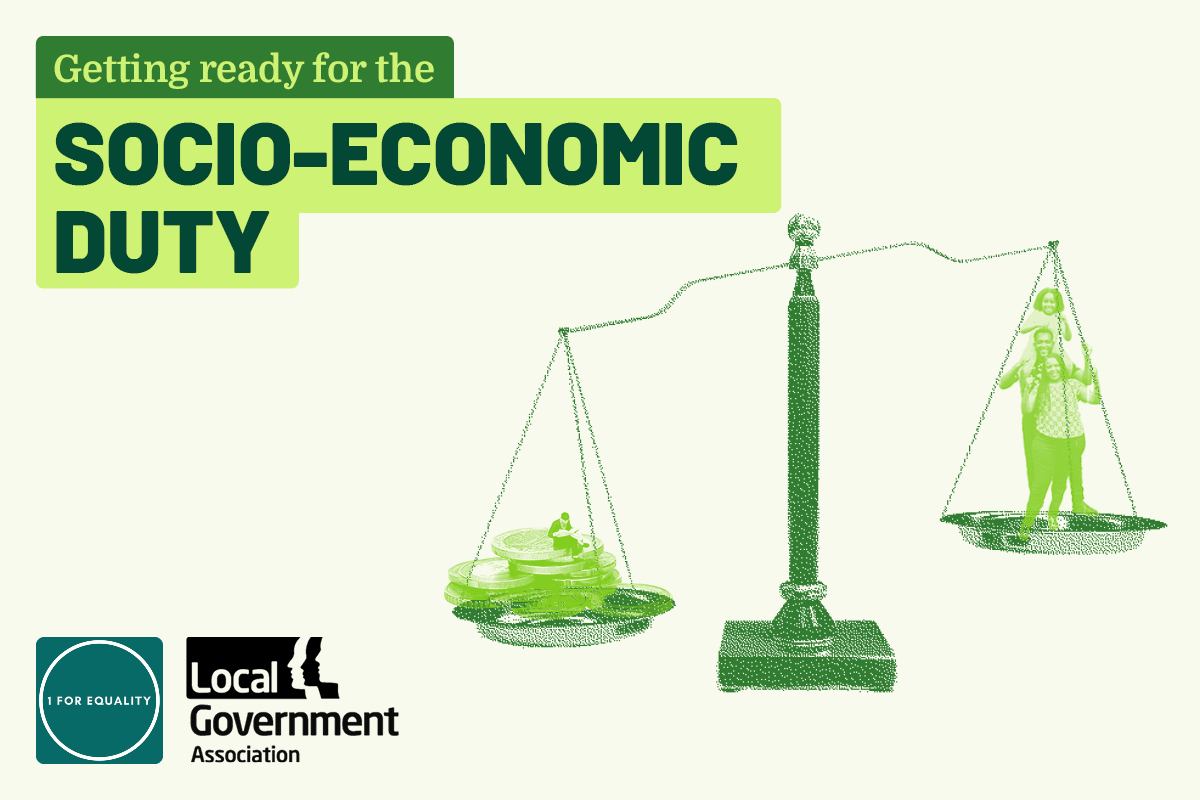Socio-Economic Duty
The UK is one of the most economically and socially unequal countries in the developed world. However, the government does have an opportunity to change this: the never-enacted socio-economic duty, section 1 of The Equality Act 2010. After the 2010 election, the then-government decided not to bring the socio-economic into force – but it’s still possible to enact it now.
The #1forEquality campaign was launched in 2017 with our partners, Just Fair. Together, we’re campaigning for the socio-economic duty to be commenced nationally, and for as many local bodies as possible to adopt it now.
What is the Socio-Economic Duty?
Section 1 of the Equality Act 2010: “An authority to which this section applies must, when making decisions of a strategic nature about how to exercise its functions, have due regard to the desirability of exercising them in a way that is designed to reduce the inequalities of outcome which result from socio-economic disadvantage.”
Section 1 of the Equality Act 2010 introduces a socio-economic duty on public bodies:
“An authority to which this section applies must, when making decisions of a strategic nature about how to exercise its functions, have due regard to the desirability of exercising them in a way that is designed to reduce the inequalities of outcome which result from socio-economic disadvantage.”
The socio-economic duty requires public bodies to adopt transparent and effective measures to address the inequalities that result from differences in occupation, education, place of residence or social class. However, successive governments have refused to enact it as law.
2018
The Scottish Parliament enact the Fairer Scotland Duty, bring the socio-economic duty into force in Scotland.
2021
The Welsh Government enacts the socio-economic duty in Wales.
2024
The GFTU launches Make Equality Real, calling on the next government to commence the socio-economic duty.
2024
The Labour Party includes commencing the socio-economic duty in their election manifesto.
Progress has already been made in parts of the UK. In April 2018 the Scottish Parliament enacted the Fairer Scotland Duty, which is the name given to the socio-economic duty in Scotland. Wales followed in March 2021, and a number of local councils in the UK have adopted some of the key policies of the socio-economic duty. So far North Tyneside Council, Newcastle City Council, South Tyneside Council, and Middlesbrough Council, among others, have decided to treat the socio-economic duty as if it were in force.

What are we striving to achieve?
Nationally
The goal of this campaign is for the government to trigger the socio-economic duty, section 1 of the Equality Act 2010. The Equality Trust is working with Just Fair and 60 other individuals and groups to achieve this.
Working under the #1forEquality campaign banner, we asked MPs to support our Early Day Motion 591, on the commencement and enforcement of the socio-economic duty, in 2017. We had the support of 82 MPs, and in the years after grew support across parties. At a local level, the Fairness Five pledges to enact the socio-economic duty at a local level won support from several major city councils.
The Labour Party included enacting the socio-economic duty in their manifest for the 2024 general election, and we joined the General Federation of Trade Unions on Make Equality Real to demand that promise is kept.
Locally
We are raising awareness of the socio-economic duty as a tool that can support inequality reduction, both top-down and bottom-up.
We do this by holding creative work at a grassroots level with community groups, campaigners and residents; recognising that the SED raises broader questions of who gets to imagine change, how it is meaningfully created, and ensuring that the process itself is rewarding. Our Birmingham organiser has led Conversations of Change workshops and Community Reporting workshops to train a new cohort of empowered activists to call for a more equal Birmingham, with similar work taking place in London.
Get Ready for the Socio Economic Duty
We offer training and coaching on implementing the socio-economic duty for organisations and local authorities. Get in touch with us now to find out more.
‘What is the socio-economic duty?’ talk
The socio-economic duty remains poorly understood by many institutions that will need to implement it if it’s indeed commenced nationally. We offer talks to explain the socio-economic duty as a tool to reduce inequality.
Lived Experience Panel
We are establishing a lived-experience panel who will be exploring the structures of policy, economy and decision-making. Their research, evidence and insights will inform our advocacy around the socio-economic duty in future.
Training
We offer training for local authorities and institutions on the practical steps for making change happen and integrating the socio-economic lens into existing Equality Impact Assessment.
Sharing evidence
The evidence we gather about the power of participation and participatory democracy will be shared to help guide other organisations learning to embrace co-design.
Resources
- Just Fair’s page on the socio-economic duty and their 2022 briefing on the social and legal case for commencing the duty
- Resolve Poverty’s Briefing on the socio-economic duty in England (2022)
- Official guidance on the Fairer Scotland Duty and the socio-economic duty in Wales from their respective governments
- The Equality and Humans Rights Commission’s evaluation of the socio-economic duty in Scotland and Wales (2021)
- Case studies on the socio-economic duty’s impact in Wales and the local authorities that voluntarily adopted it in England, produced by Just Fair and Resolve Poverty in 2023
- Template for a socio-economic duty assessment created by Salford City Council (2022)

Funding
This work would not have been possible without the donations of our hundreds of supporters, alongside the Joseph Rowntree Charitable Trust, who support some of our operating costs, and the Esmee Fairbairn Foundation, who are providing core funding for this work.
Please help us to do more of this work by becoming a supporter today.
Inequality in Your Inbox?
Get the news that matters direct to your inbox every week
by signing up for our newsletter

